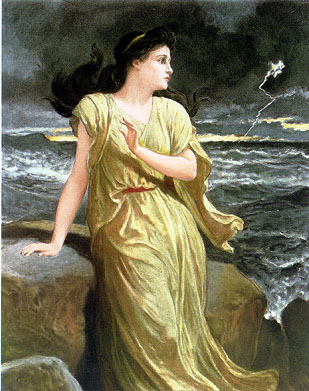I'm absolutely loving "The Tempest" aren't you? I've never read it before, so this is a great experience for me. I love navigating the text and trying to piece together the plot as I go. And the fact that it isn't in our modern dialogue makes it all the more exciting don't you think? I mean don't you feel smart reading Shakespeare?! Even if you don't completely understand it, isn't it exciting to attempt to read text like this?
The reason for my blog title is quite simple. Something that I'm really interested in is history. And it just so happens that this play really piqued my interest. I wanted to understand it better. Specifically, I wanted to understand the history of creative adaptations that have been pursued by artists throughout the years. And boy did I find a lot! There were so many artists who created paintings and musical interpretations of Shakespeare's famous work. One painting that really struck me was:
 "O, the cry did knock against my very heart. Poor souls, they perish'd"- Miranda
"O, the cry did knock against my very heart. Poor souls, they perish'd"- Miranda
Created by Frederick Goodall in 1888 this painting was part of a series of 21 paintings, entitled "Shakespeare's Heroines" exhibited by the London newspaper The Graphic. I love the attention to detail and the contrasting colors that Goodall employs in creating his imagery.
You can see most of the other paintings here: http://www.english.emory.edu/classes/Shakespeare_Illustrated/Graphic.html
I also investigated musical interpretations of Shakespeare's moving work. Initially, I was impressed by the fluidity and musicality of the text:
ARIEL
I was curious to see how composers may have interpreted words into music. Did you know that Tchaikovsky wrote several pieces inspired by Shakespeare, including "Hamlet" "Romeo and Juliet" and "The Tempest?" I knew about "Romeo and Juliet" but I didn't know about "The Tempest." Apparently, it is not played frequently, which is a shame because it is beautiful. I loved what Gustavo Dudamel (Conductor of the L.A. Philharmonic) had to say about Tchaikovsky and Shakespeare:
And it wouldn't be fair to talk about how amazing Tchaikovsky's "The Tempest" is without giving you a small taste of what it actually sounds like! I hope you enjoy!
Seriously isn't that and awesome boat in the video?!
Alright, I have a few questions for you to think about! Is there anything interesting that you've disovered about the history of the text? And, do you think that these composers and artists stay true to Shakespeare's words? Let me know what you think!
The reason for my blog title is quite simple. Something that I'm really interested in is history. And it just so happens that this play really piqued my interest. I wanted to understand it better. Specifically, I wanted to understand the history of creative adaptations that have been pursued by artists throughout the years. And boy did I find a lot! There were so many artists who created paintings and musical interpretations of Shakespeare's famous work. One painting that really struck me was:
Created by Frederick Goodall in 1888 this painting was part of a series of 21 paintings, entitled "Shakespeare's Heroines" exhibited by the London newspaper The Graphic. I love the attention to detail and the contrasting colors that Goodall employs in creating his imagery.
You can see most of the other paintings here: http://www.english.emory.edu/classes/Shakespeare_Illustrated/Graphic.html
I also investigated musical interpretations of Shakespeare's moving work. Initially, I was impressed by the fluidity and musicality of the text:
ARIEL
To every article.Can you hear the music in your mind when you read those words or is it just me?
I boarded the king's ship; now on the beak,
Now in the waist, the deck, in every cabin,
I flamed amazement: sometime I'ld divide,
And burn in many places; on the topmast,
The yards and bowsprit, would I flame distinctly,
Then meet and join. Jove's lightnings, the precursors
O' the dreadful thunder-claps, more momentary
And sight-outrunning were not; the fire and cracks
Of sulphurous roaring the most mighty Neptune
Seem to besiege and make his bold waves tremble,
Yea, his dread trident shake.
I was curious to see how composers may have interpreted words into music. Did you know that Tchaikovsky wrote several pieces inspired by Shakespeare, including "Hamlet" "Romeo and Juliet" and "The Tempest?" I knew about "Romeo and Juliet" but I didn't know about "The Tempest." Apparently, it is not played frequently, which is a shame because it is beautiful. I loved what Gustavo Dudamel (Conductor of the L.A. Philharmonic) had to say about Tchaikovsky and Shakespeare:
Alright, I have a few questions for you to think about! Is there anything interesting that you've disovered about the history of the text? And, do you think that these composers and artists stay true to Shakespeare's words? Let me know what you think!

Thanks for sharing! I think the musicality of Shakespeare is amazing. It is so skillfully crafted it is easy to transform into other mediums.
ReplyDeleteI think that the music does justice to Shakespeare in it's own way. However, it is next to impossible to compare to the literature. In order to create a good adaptation of Shakespeare it must be just that--an adaptation. Every medium functions in it's own way. Music, plays, readings, the text itself, all give something different to an eager learner.
I love to discover Shakespeare in many different mediums, because they all have something different to offer.
I felt awful as I was going through "The Tempest' because I couldn't understand most of the contents, but I'm inspired by how you get excitement out of it. I hope that I will get to such a state.
ReplyDelete